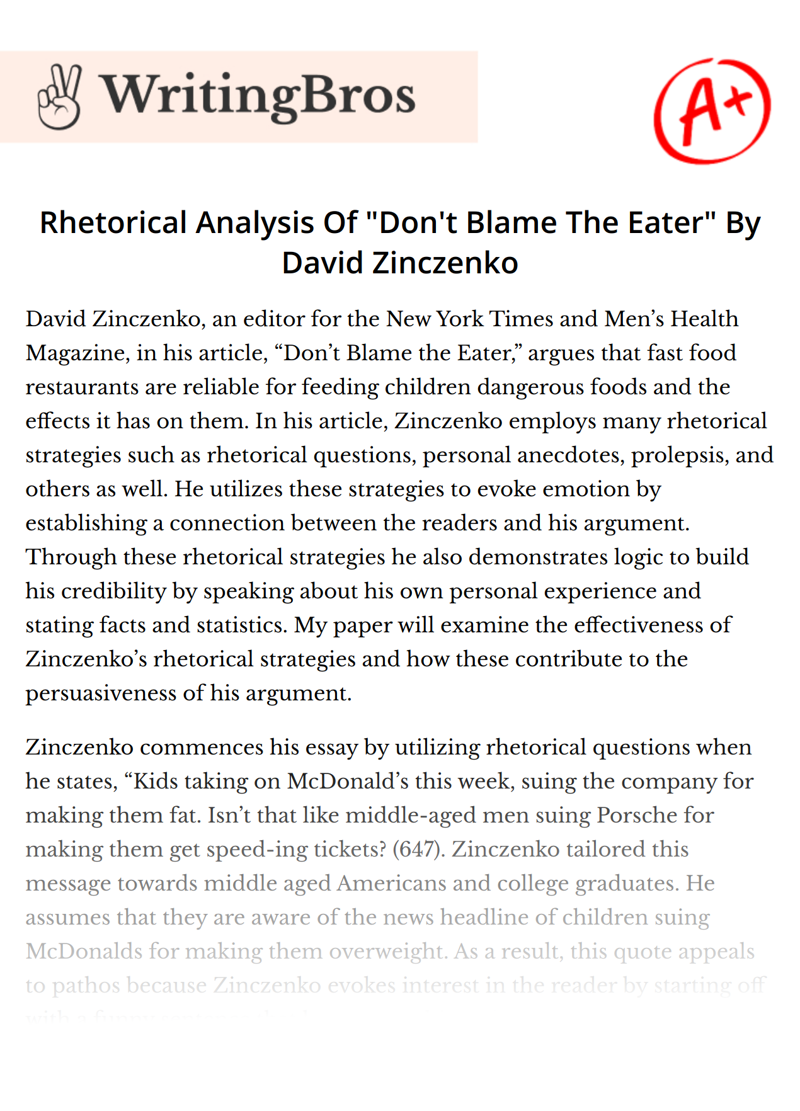Rhetorical Analysis Of "Don't Blame The Eater" By David Zinczenko
 Read Review
Read Review

David Zinczenko, an editor for the New York Times and Men’s Health Magazine, in his article, “Don’t Blame the Eater,” argues that fast food restaurants are reliable for feeding children dangerous foods and the effects it has on them. In his article, Zinczenko employs many rhetorical strategies such as rhetorical questions, personal anecdotes, prolepsis, and others as well. He utilizes these strategies to evoke emotion by establishing a connection between the readers and his argument. Through these rhetorical strategies he also demonstrates logic to build his credibility by speaking about his own personal experience and stating facts and statistics. My paper will examine the effectiveness of Zinczenko’s rhetorical strategies and how these contribute to the persuasiveness of his argument.
Zinczenko commences his essay by utilizing rhetorical questions when he states, “Kids taking on McDonald’s this week, suing the company for making them fat. Isn’t that like middle-aged men suing Porsche for making them get speed-ing tickets? (647). Zinczenko tailored this message towards middle aged Americans and college graduates. He assumes that they are aware of the news headline of children suing McDonalds for making them overweight. As a result, this quote appeals to pathos because Zinczenko evokes interest in the reader by starting off with a funny sentence that he assumes his audience can relate to, making them want to continue reading. By utilizing this rhetorical question, he points out how ludicrous it is to blame someone for something that is their fault, however he sympathizes with the children. He sympathizes with these children, because he used to be one himself. Through a personal anecdote, he states that fast-food restaurants such as Pizza Hut and McDonalds were all his mother could afford, making it his only food choices for lunch and dinner. As a result of this, he became a “torpid teenage tallow” (Zinczenko 648). Zinczenko uses imagery to describe his childhood to show his readers that he experienced the issue first handedly to express that there is a lack of healthy alternatives to fast food. His anecdote further argues his point that fast food restaurants are to blame for perpetuating the obesity epidemic in children. This is effective in persuading his audience because it appeals to ethos, showing his readers that he is credible to speak on this topic.
In addition, Zinczenko cites numerous statistics regarding how fast food restaurants have aided in the increase of diabetes in recent years. He juxtaposes the past and the present by claiming, “Before 1994, diabetes in children was generally caused by a genetic disorder—only about 5 percent of childhood cases were obesity-related, or Type 2, diabetes. Today… Type 2 diabetes accounts for at least 30 percent…” (648). He does not sugarcoat this information, he is very straightforward and honest when speaking about children having diabetes because of the fast food they consume. He assumes his audience knows how diabetes can deteriorate one’s health, especially a childs. While listing the percentages of how diabetes in children has increased, Zinczenko claims that it is “not surprisingly, [that] money spent to treat diabetes has skyrocketed, too” (Zinczenko 648). This appeals to logos because he cites The Centers for Disease Control and Prevention the National Institutes of Health to reinforce to his audience his expertise on this topic and why it is subject of matter.
Near the ending, Zinczenko employs prolepsis by asking consumers shouldn’t they “know better than to eat meals a day in fast-food restaurants?” (649). “The Rhetorician’s Toolbox” defines prolepsis as “anticipatory refutation of opposition or addressing the skeptical audience’s doubts.” He quickly refutes this by arguing that fast food is far more accessible and affordable than alternatives such as fresh food. Through this, he aims to reinforce the fact that the consumer should not be blamed for their eating habits. Zinczenko further notes that the calorie intake information is often not provided on fast-food packaging, making it difficult for the consumer to understand what they are consuming. He utilizes a hyperbole when discussing the nutritional value on a salad, claiming that if you “add a serving of the 280 calorie dressing… you're suddenly up around 1,040 calories” (649). Zinczenko assumes the consumers go into these fast food restaurants blindly knowing this information, therefore he magnifies the calories and serving sizes these foods contain to the reader. This appeals to pathos because he argues that if the obesity epidemic goes unsolved, it will become an irreversible issue and “we’ll see more sick, obese children and more angry, litigious parents” (Zinczenko 649).
Zinczenko utilized many rhetorical strategies such as rhetorical questions, personal anecdotes, prolepsis, and others as well. These rhetorical strategies were effective in arguing that these fast food restaurants are a problem because the food that is served is linked to obesity, diabetes, and other harmful effects. Zinczenko uses these strategies to appeal to the larger appeals such as ethos, pathos, and logos. Zinczenko’s approach on this subject is effective because it allows for the audience to place a new perspective on fast food restaurants and the effects it has on its consumers.
Cite this Essay
To export a reference to this article please select a referencing style below




